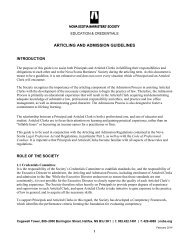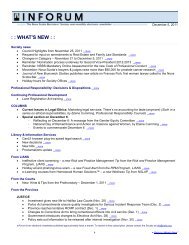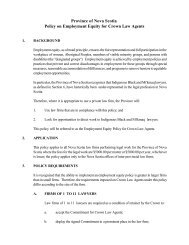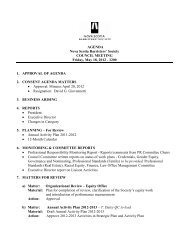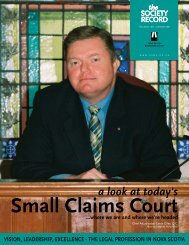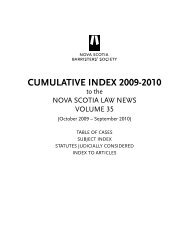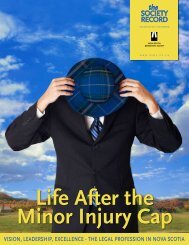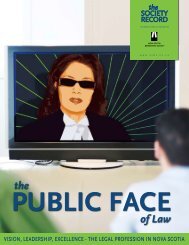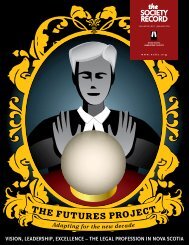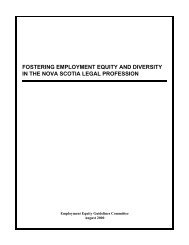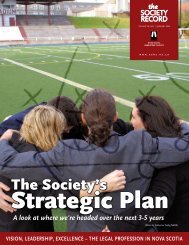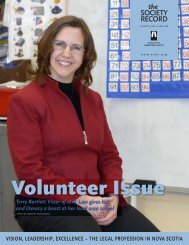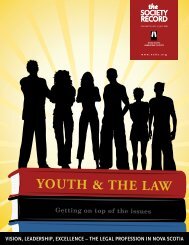SR Vol 27 No 4, October 2009 - Nova Scotia Barristers' Society
SR Vol 27 No 4, October 2009 - Nova Scotia Barristers' Society
SR Vol 27 No 4, October 2009 - Nova Scotia Barristers' Society
- No tags were found...
Create successful ePaper yourself
Turn your PDF publications into a flip-book with our unique Google optimized e-Paper software.
ACCOLADESTwenty years have passed since the Royal Commission onthe Donald Marshall, Jr., Prosecution indentified the needfor the increased presence of Aboriginal and racializedpeoples in all aspects of the legal profession. As the Marshall Inquirydocumented, the problem is not with Aboriginal peoples or membersof racialized communities but with the values, norms and personalprejudices inherent in a different cultural system. The legal needs ofAboriginal or racialized community members at a community levelare influenced by a number of factors that require knowledge of localculture and traditions, and contacts within that community.In 1989 the Indigenous Blacks & Mi’kmaq (IB&M) Initiative was establishedat Dalhousie Law School. It was hoped that by increasing representationfrom these communities in the legal profession, the effectsof systemic discrimination would be greatly reduced. The Initiative’sobjective is to facilitate access of African <strong>No</strong>va <strong>Scotia</strong>ns and Mi’kmaqpeople into law school and the profession, while also attempting to addressissues of racism in legal education and the legal profession.Professor Michelle Williams-Lorde joined Dalhousie Law School in2004 as Director of the IB&M Initiative and Assistant Professor. Shebrought with her an incredible background, insight and energy. Bornand raised in <strong>No</strong>va <strong>Scotia</strong>, she earned her social work degree at DalhousieUniversity, her LL.B. at the University of Toronto and herLL.M. at New York University.According to Ms. Williams-Lorde, one of the most rewarding aspectsof the IB&M Initiative is recruiting new students for first-year lawschool. She attempts to meet with each applicant in person or byphone in order to provide support, answer questions and demystifythe application process. She also tries to ensure that each applicantand student realizes the importance and value of his or her presenceat law school. She never ceases to be amazed at the potential that isuncovered, and impressed by what the graduates go on to achieve.Strategies have been developed to encourage entrance into first-yearlaw school. Short-term recruitment involves targeting students whoare ready to apply to law school within a year or so. Contact is madewith universities and student advisors to ensure that all students areaware of the Initiative. Free seminars twice a year focus on the applicationprocess and LSATpreparation.Catherine Benton<strong>No</strong>va <strong>Scotia</strong> Legal Aid, BridgewaterLong-term recruitment involvesvisiting high schools, organizations and communities on ageographic basis annually. Ms. Williams-Lorde is always sure to havea few current law students accompany her on these visits. The youngpeople immediately identify and connect with the law students as thepossibilities of the entry into the legal profession become more real.There is a sense of, “Hey, I can do this too.”Since the IB&M Initiative’s inception, there have been over 110 lawgraduates. With pride, Professor Williams-Lorde notes that whileat law school, these alumni have included three valedictorians, twostudent law society presidents and six recipients of the David JonesMemorial Award, provided to a third-year student who has been thegreatest source of inspiration to his or her classmates.Their contributions have been significant to the legal profession. Theyhave obtained positions as legal counsel to First Nations, provincialand federal departments, legal aid offices and in private firms, whilesome find careers as academics and policy advisors, or participate inthe political arena.Increasing representation from Aboriginal and racialized communitiesin the legal profession will inevitably aid in ensuring that thejustice system is more responsive to and representative of the communitiesit services. The IB&M Initiative has been an incredible andunprecedented success. In memory of the legacy of Donald Marshall,Jr., it is hoped that the justice system will remember its obligation toencourage and ensure access at all levels.We welcome your submission to Accolades! In each column we will showcasea different lawyer, firm, group or association to recognize how theyare effecting change in the profession. Feel free to contact a member of theGender Equity Committee or Equity Officer Emma Halpern at equity@nsbs.org to discuss your submission.<strong>October</strong> <strong>2009</strong> 15



